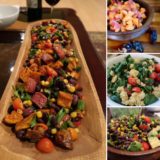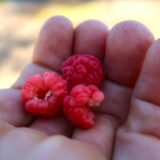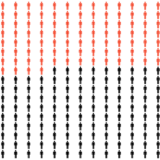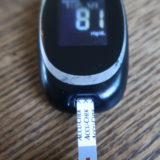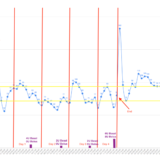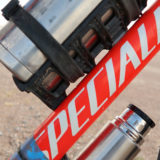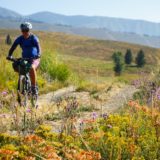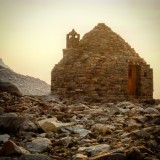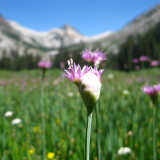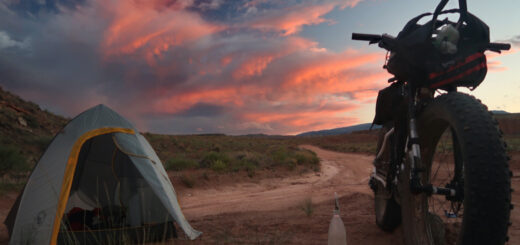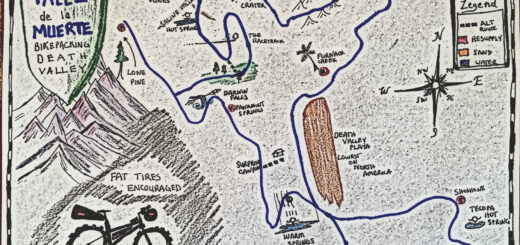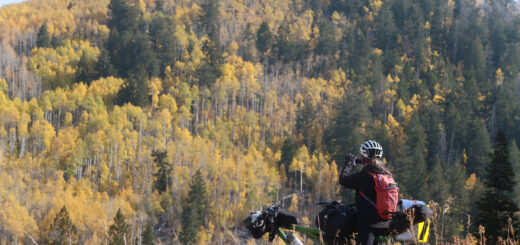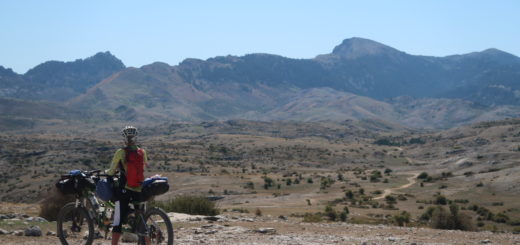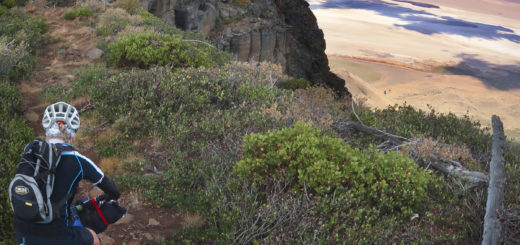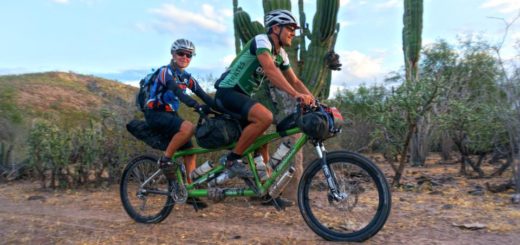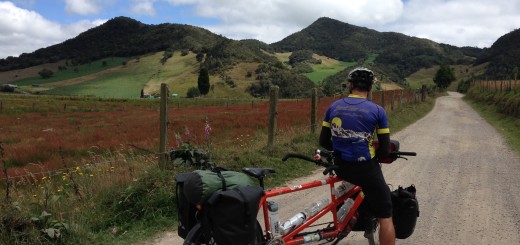01/18/2024 Bikepacking Guinea Day 163 : The Geography of Personality
Whenever I see a woman dressed in burqa, I can’t help but think of an armored tank. I think most of my readers know what burqa looks like, but just in case, I have included an internet photo of the closest thing I could find to what I’ve been seeing. Surprisingly, there were not any photos of the style in Western Africa, which is even more restrictive with an additional black mesh over the eyes.
There is a word in the Spanish language that constantly pops into my head when I see these women: “blindado”. In English, that means “armor-plated,” such as one of those trucks that drives around carrying money. The double entendre, which you may have immediately noticed, is that it looks and sounds a lot like the English word, “blinded.” The women are blinded from sight.
But is that really true? You may remember from yesterday’s post that I stated, “I could tell by her kinesthetics that she was a friendly person under that shroud of fabric.” I can’t even tell you how this is possible, but I think that all of us humans are naturally able to quickly detect characteristics of personality - even without being able to see one’s face.
As you may have noticed, I’ve been especially fond of people’s personalities in Guinea. I have been ascribing all of the “goodness” to the entire country… but that isn’t fair or accurate. Today I dropped off of the plateau, and within the space of just a QUARTER of a vertical mile, everything is changed: A lot fewer smiles and friendly waves.
It’s the same country, same road even… but suddenly people behave differently.
Almost all travelers, myself included, like to say, “In x country, people are nice!” While there may be some truth to that, transitions like today show that human behavior a lot more nuanced than just being defined by political borders.
I’ve discussed this previously in moving from the Guatemalan or Colombian highlands down to their respective lowlands; the pattern repeats itself: People in the mountains are smiling, friendly, and polite; in the lowlands, I’ll get cold stares, cat calls, less apparent education, things thrown at me… What gives?
The theory I have is that almost all people are innately kind and friendly like the highlanders. Even in the absence of all the material items I’ve highlighted in previous posts, people continue to be warm and friendly. But there seems to be a threshold… a cracking point where you take so much away, and then add on the discomfort of being constantly hot and wet (yes, even at the driest time of the year)… and people break down. It overwhelms their capacity for kindness.
You’ll notice lately that I’ve been oscillating between the 8° and 9° latitude line, and it seems to me that there’s a sharp delineation between personality at that line where people at 9° and North are friendly and happy, whereas challenges arise as you go South of 8°. In December/January for West Africa, it seems that latitude plays just as much of a role for humidity than elevation - and personalities follow suite.
Coincidentally, the Christians live south of the demarcation line, and the Muslims generally live North of it. I don’t mean to plant that seed in your head, but it makes the Muslims appear to be much more friendly than Christians. I’ve played with the idea that a society where the standard greeting is: “Peace be with you” might be on to something.
But correlation is not causation, and it’s easy to see that theory is wrong because there are areas where the Muslims and Christians mix. Once you mix in the mostly-Christian data from Latin America, it is obvious that friendliness can be influenced by climate, not religion. I wonder what stroke of fate placed the Christian majority in the steamy tropics of West Africa?
You know from my posts that Sierra Leone and Liberia both had (relatively) recent prolonged civil wars. Both lie below that demarcation line, and even without a war, Sierra Leone definitely had a pugilistic feel about it. You may recall that I saw loud arguments on a daily basis. I haven’t seen anyone mention this, but could a downstream consequence of global warming be an increase in bellicose behavior?
*******
The transition to the Ivory Coast today was slow and tedious, but absent of any corruption. At each checkpoint, officers would lie slouched in the shade. When I arrived, they would hardly budge. With the minimum effort possible, they’d anemically gesture to indicate where I was to go next. I could see beads of perspiration on the foreheads of the police processing my paperwork with sloth like movements. As a cyclist, I have the benefit of wind-generated air conditioning - as long as I can keep moving.
In spite of the road being more than 75 percent paved into the Ivory Coast, there were only 2 other people crossing. It took me over an hour to stamp out of Guinea, and stamp into Ivory Coast. Today would be the first time anyone has ever asked to see my Yellow Fever vaccination card.
At first glance, Ivory Coast seemed like a major upgrade to the last 6 weeks of my life. Paved roads with a shoulder, strung power lines. Electricity! Infrastructure! Oddly, though, as I rode, I noticed disheveled shacks and people - threadbare clothing covered in more grease and dirt than ever. Smells of dead carcasses and fecal matter everywhere surrounding the villages. A couple of young men rushed me aggressively. I don’t know what they were yelling, but I had to swing wide as they ran towards me with angry faces. A little girl waggled a fish at me. If you saw Biff’s world in Back to the Future II, it felt like that only several times worse and stinkier.
I was happy to find a grocery where you can walk around with a basket. Besides that one in Freetown, I haven’t had this since Senegal many weeks ago. At the checkout, a man designated for bagging started to put stuff in a sack. I said “I do not need a bag,” so he grabbed a thicker sack instead. I started putting stuff in my backpack. He started grabbing it from me and putting it in the thicker sack. I’m telling you this because it happens everywhere I go - people are very grabby all over Africa. Also, the concept of “bring your own bag” is completely foreign. Often times, I lose the grab fight.
People grab everything, and often boss me around. A common move is for me to park my bike, and someone will grab it and move it to an equal, but different location. Why? It’s not like I was blocking a door.
I will ask, “Can you change Euros to the local currency?”
They will always say, “let me see it.”
I withdraw the bill, they grab it and say, “you can go over there to change it.”
“Can I have my bill back please?”
Nothing.
I always have to grab it back. I don’t think they are trying to steal; it’s just grab grab grab.
So, back to the store: the lady operating the register didn’t have the correct change - so she automatically decided to beep in a candy and a chocolate to make my bill high enough that she would have the correct coins and bills to return.
I put the candy back in the little bin by the register, and immediately, the bagger grabbed it and ate it.
Welcome to Ivory Coast!
I know better now than to judge a country based on the border region. Let’s see how Ivory Coast shapes up. Hopefully, the geography of personality will swing in a better direction as we move into the heart of this new country.
🇨🇮
There is a word in the Spanish language that constantly pops into my head when I see these women: “blindado”. In English, that means “armor-plated,” such as one of those trucks that drives around carrying money. The double entendre, which you may have immediately noticed, is that it looks and sounds a lot like the English word, “blinded.” The women are blinded from sight.
But is that really true? You may remember from yesterday’s post that I stated, “I could tell by her kinesthetics that she was a friendly person under that shroud of fabric.” I can’t even tell you how this is possible, but I think that all of us humans are naturally able to quickly detect characteristics of personality - even without being able to see one’s face.
As you may have noticed, I’ve been especially fond of people’s personalities in Guinea. I have been ascribing all of the “goodness” to the entire country… but that isn’t fair or accurate. Today I dropped off of the plateau, and within the space of just a QUARTER of a vertical mile, everything is changed: A lot fewer smiles and friendly waves.
It’s the same country, same road even… but suddenly people behave differently.
Almost all travelers, myself included, like to say, “In x country, people are nice!” While there may be some truth to that, transitions like today show that human behavior a lot more nuanced than just being defined by political borders.
I’ve discussed this previously in moving from the Guatemalan or Colombian highlands down to their respective lowlands; the pattern repeats itself: People in the mountains are smiling, friendly, and polite; in the lowlands, I’ll get cold stares, cat calls, less apparent education, things thrown at me… What gives?
The theory I have is that almost all people are innately kind and friendly like the highlanders. Even in the absence of all the material items I’ve highlighted in previous posts, people continue to be warm and friendly. But there seems to be a threshold… a cracking point where you take so much away, and then add on the discomfort of being constantly hot and wet (yes, even at the driest time of the year)… and people break down. It overwhelms their capacity for kindness.
You’ll notice lately that I’ve been oscillating between the 8° and 9° latitude line, and it seems to me that there’s a sharp delineation between personality at that line where people at 9° and North are friendly and happy, whereas challenges arise as you go South of 8°. In December/January for West Africa, it seems that latitude plays just as much of a role for humidity than elevation - and personalities follow suite.
Coincidentally, the Christians live south of the demarcation line, and the Muslims generally live North of it. I don’t mean to plant that seed in your head, but it makes the Muslims appear to be much more friendly than Christians. I’ve played with the idea that a society where the standard greeting is: “Peace be with you” might be on to something.
But correlation is not causation, and it’s easy to see that theory is wrong because there are areas where the Muslims and Christians mix. Once you mix in the mostly-Christian data from Latin America, it is obvious that friendliness can be influenced by climate, not religion. I wonder what stroke of fate placed the Christian majority in the steamy tropics of West Africa?
You know from my posts that Sierra Leone and Liberia both had (relatively) recent prolonged civil wars. Both lie below that demarcation line, and even without a war, Sierra Leone definitely had a pugilistic feel about it. You may recall that I saw loud arguments on a daily basis. I haven’t seen anyone mention this, but could a downstream consequence of global warming be an increase in bellicose behavior?
*******
The transition to the Ivory Coast today was slow and tedious, but absent of any corruption. At each checkpoint, officers would lie slouched in the shade. When I arrived, they would hardly budge. With the minimum effort possible, they’d anemically gesture to indicate where I was to go next. I could see beads of perspiration on the foreheads of the police processing my paperwork with sloth like movements. As a cyclist, I have the benefit of wind-generated air conditioning - as long as I can keep moving.
In spite of the road being more than 75 percent paved into the Ivory Coast, there were only 2 other people crossing. It took me over an hour to stamp out of Guinea, and stamp into Ivory Coast. Today would be the first time anyone has ever asked to see my Yellow Fever vaccination card.
At first glance, Ivory Coast seemed like a major upgrade to the last 6 weeks of my life. Paved roads with a shoulder, strung power lines. Electricity! Infrastructure! Oddly, though, as I rode, I noticed disheveled shacks and people - threadbare clothing covered in more grease and dirt than ever. Smells of dead carcasses and fecal matter everywhere surrounding the villages. A couple of young men rushed me aggressively. I don’t know what they were yelling, but I had to swing wide as they ran towards me with angry faces. A little girl waggled a fish at me. If you saw Biff’s world in Back to the Future II, it felt like that only several times worse and stinkier.
I was happy to find a grocery where you can walk around with a basket. Besides that one in Freetown, I haven’t had this since Senegal many weeks ago. At the checkout, a man designated for bagging started to put stuff in a sack. I said “I do not need a bag,” so he grabbed a thicker sack instead. I started putting stuff in my backpack. He started grabbing it from me and putting it in the thicker sack. I’m telling you this because it happens everywhere I go - people are very grabby all over Africa. Also, the concept of “bring your own bag” is completely foreign. Often times, I lose the grab fight.
People grab everything, and often boss me around. A common move is for me to park my bike, and someone will grab it and move it to an equal, but different location. Why? It’s not like I was blocking a door.
I will ask, “Can you change Euros to the local currency?”
They will always say, “let me see it.”
I withdraw the bill, they grab it and say, “you can go over there to change it.”
“Can I have my bill back please?”
Nothing.
I always have to grab it back. I don’t think they are trying to steal; it’s just grab grab grab.
So, back to the store: the lady operating the register didn’t have the correct change - so she automatically decided to beep in a candy and a chocolate to make my bill high enough that she would have the correct coins and bills to return.
I put the candy back in the little bin by the register, and immediately, the bagger grabbed it and ate it.
Welcome to Ivory Coast!
I know better now than to judge a country based on the border region. Let’s see how Ivory Coast shapes up. Hopefully, the geography of personality will swing in a better direction as we move into the heart of this new country.
🇨🇮
Photos:

Bonjour!

Internet photo; not mine. It would probably be tricky to ask for a photo like this (maybe possible; I have not tried). This illustrates what the burqa looks like here, except you need to add a veil over the eyes too - like black pantyhose fabric. I could not find such photo on the internet, but that is what I see here.

Au revoir, Guinea 🇬🇳 !

On this route in the morning, there was a 50/50 chance of seeing a vehicle loaded like this one. Most cars had people sitting on the roof. They maximize the capacity of any motorized vehicle!
—

The downside to maximizing capacity is that every mile you see something broken down. Since the roads are curvy, people uproot plants and put them in the road to warn oncoming traffic of a hazard ahead.
—

These are red fruits used to make palm oil. From an agricultural standpoint, the lowlands are a lot more active in production than the highlands. I see banana plants, pineapple plants, date palms and cassava.
—

Everywhere today, people were processing red fruit to make palm oil. Per square mile, palm oil is the most efficient oil (in other words, you can squeeze the most oil out of the least land compared to coconut oil, soybean oil, etc). As good as this seems, palm oil production has led to massive deforestation - all that burning I see is to encourage growth of the palms that thrive after fire.
—

The fruits are boiled overnight and mashed to get the oil. I hear gas powered machines at each of these stations. I’d see men walking the streets with long lasso things. When I asked, they explained these were for climbing the trees. They then cut the bunches to fall to the ground. The women collect them and process them here.
—

I posted this photo before, but now we are full circle. On the left is the refined palm oil - really helps add calories to the diet of rice. On the right is the soap… another product of the palm oil (via saponification). This is how they make Doctor Bronners soap (I think) too…
—

In the foreground, it’s the cassava plant. This makes up another large portion of the calories consumed here. I see cassava (also called manioc or yuca) in the grocery store at home. It’s that dark brown, hard, narrow thing that looks like an elongated sweet potato. I’ve actually tried it at home, and it is a monster for blood sugars… so I haven’t bothered to eat it here.
🩸
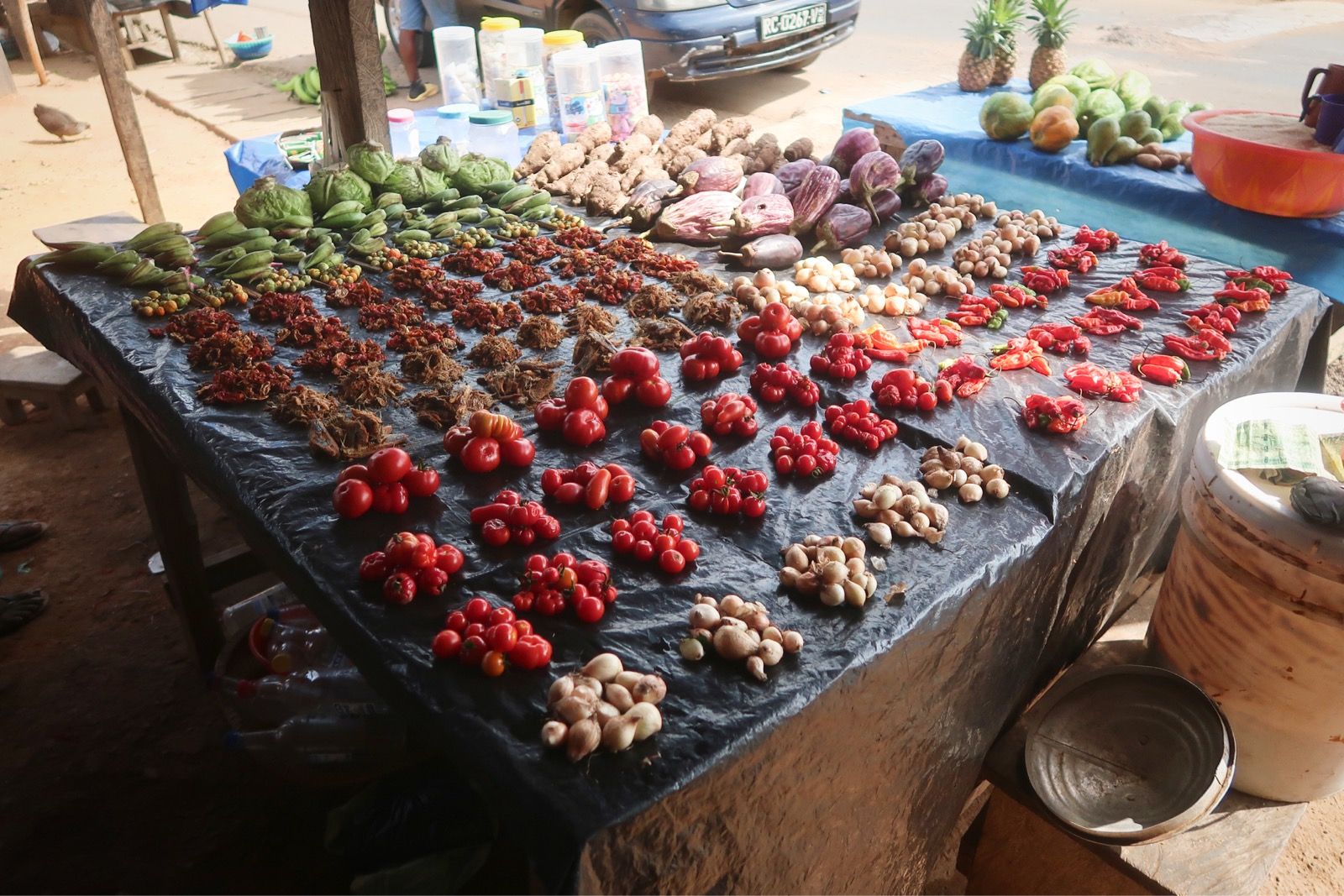
In the lowlands of Guinea, the food options increase in diversity. Except for some of the fruit, though, everything else requires a stove. To the left of the tomatoes is dried fish; the primary protein source. I see signs promoting fish farming - this seems to have been introduced by foreign aid workers to increase the protein intake.
—
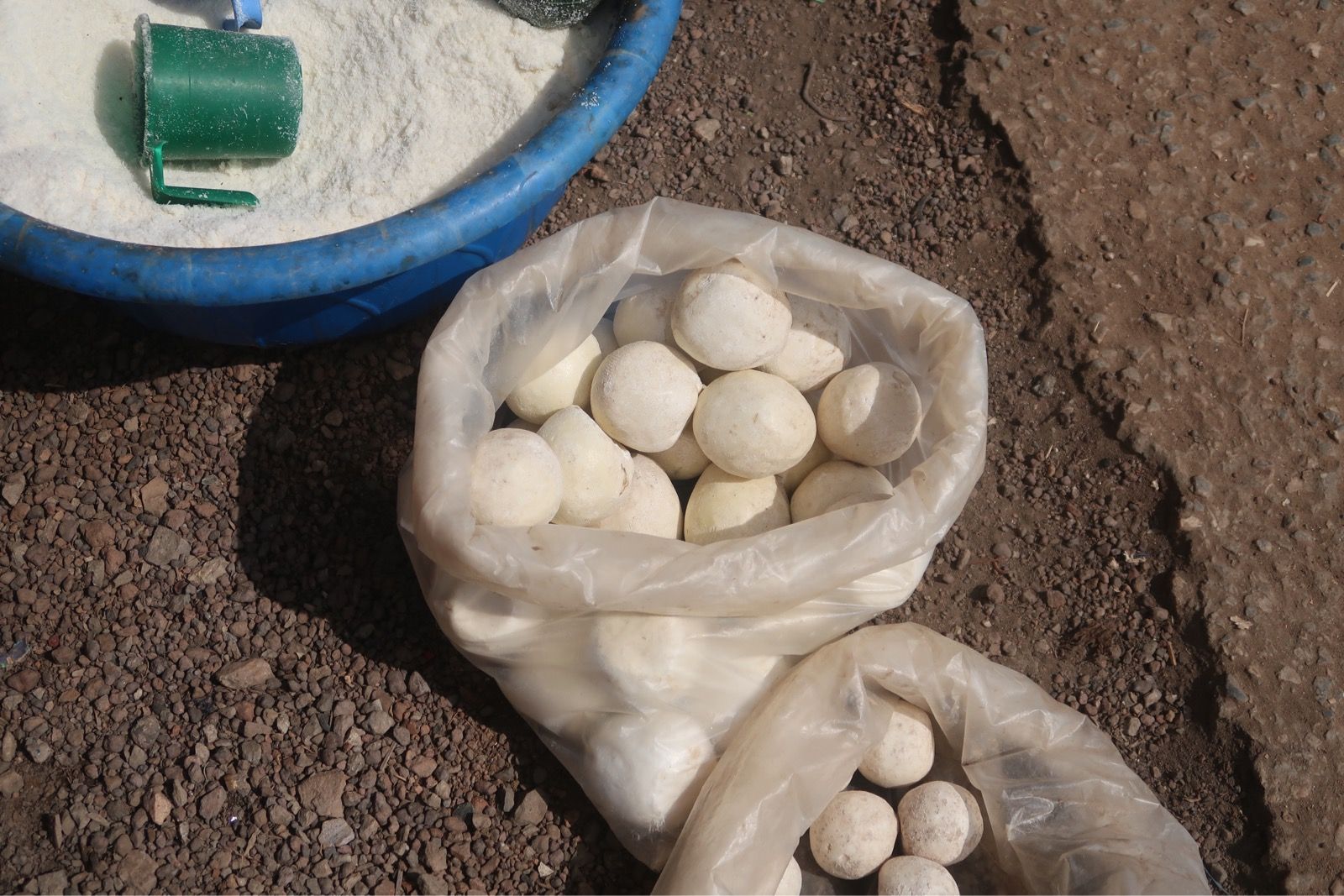
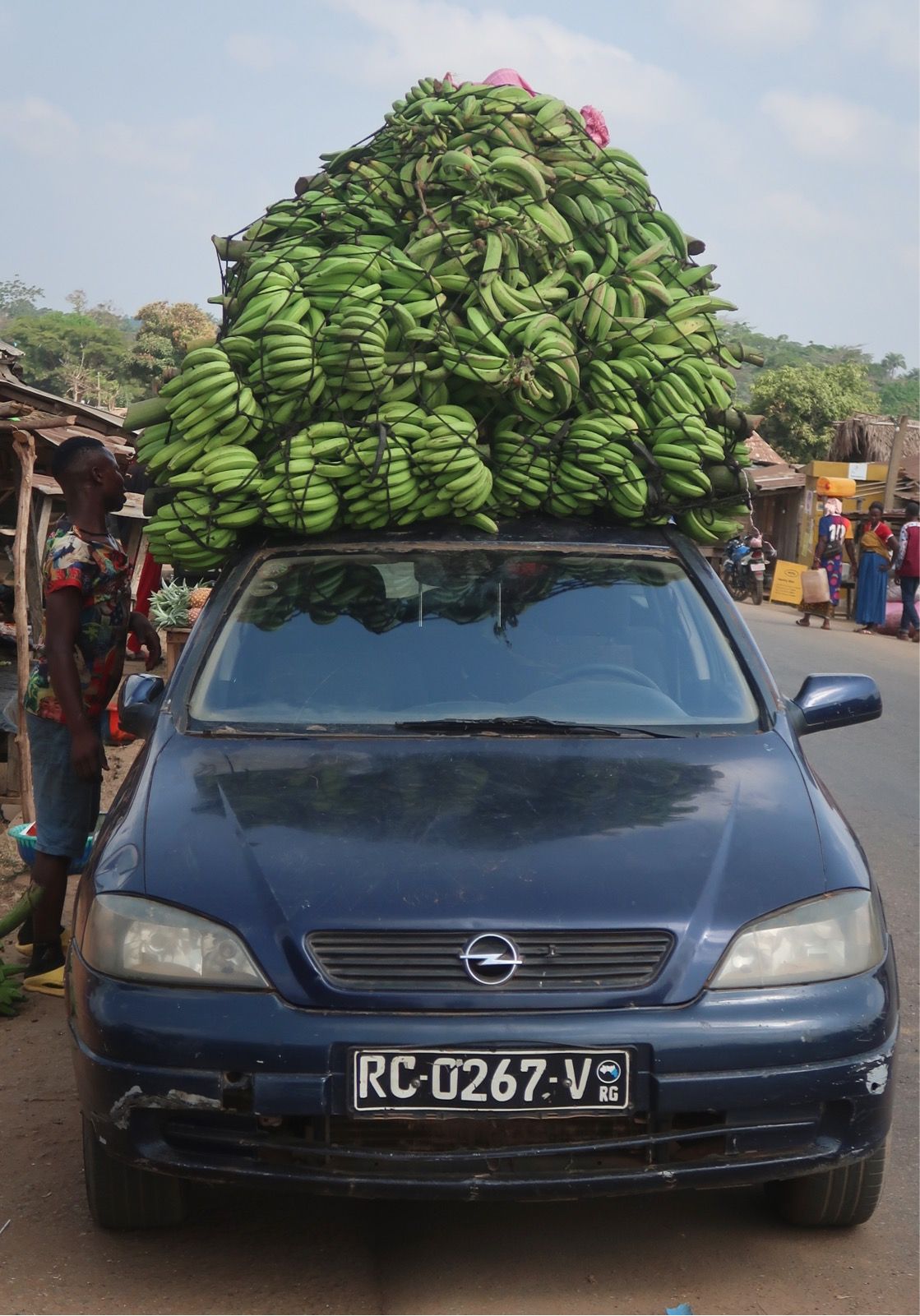

I saw the stripes on his chain stay and said, “you also have the colors of the USA” (in addition to his Guinea 🇬🇳 zip tie colors). He said, “no! France!” So not everyone in Guinea is anti-France.
—

On the right, more palm processing.
—

Kids went to school! It’s been a mixture of vacant classrooms and occupied ones. Each village is different. I have come out of the remote mountains now, so it seems like more kids go to school in the towns.
—

My route turned into some single track, which would get pretty rowdy at times. Guinea is really great for bikepacking.
—

I picked this route based on the topography. See those mountains? That is what I saw on the map that attracted me. It is a natural reserve called Nimbas. As you can see, it’s mostly on fire. I decided not to ride up there. People always ask me about animals in Africa. If we are being honest, it’s 2024, and the probability of seeing a wild animal is pretty low. Look at what people do to the land - even in nature preserves. If you’re going to see animals in Africa, it needs to be in a zoo-like setting. That begs the question: why travel from California to Africa to see wild animals in a zoo if you can just see them at San Diego’s wild animal park instead?
—

Strava Comments:
Jessica M.
Such beautiful scenery. Do you lock your bike up when you go into grocery stores, markets or checkpoints? Or just set it up against the wall…for people to grab, grab, grab!! That’s interesting about the “grabbing”!
Mark G.
A very nice century! Your analysis of human behavior and its relationship to geography and climate is very interesting. I also think the #of people per unit of land(crowding) is possibly part of a behavioral theory. Great photos today: I love banana car. And, of course, ziptie guy.
Stan H.
Compelling stuff, Brian. What Mark said! And Ziptie Guy’s bike would even turn heads at Burning Man - love the creativity and resourcefulness. I’ve noticed many of the bicycles have wheels with something like 80 spokes. For durability, I suppose. There’s barely room to get a spoke wrench on one.
Jim M.
You thoughts today remind me about the many discussions Jess and I had crossing the US - very distinct differences between what we call “Merica” vs “America” and how the people delivered their presence - it was a feeling you could perceive even before you stuck up conversation. Much less to do with what state one is in, rather their state of living (urban vs rural).
Jonathan K.
amazing adventure bro to see the world. catching up on your read. you need to write a book on your travels (with Janet too) and your memoirs
Paula G.
You are probably on to something regarding how people act differently in different locations. You are living it, and paying strong attention to it. I know that when it is very hot and humid, I am very irritable....(don't ever come visit in August).
Stan H.
...and there's also being "hangry" when one hasn't had enough eat.
Dean G.
Continue daily to look fwd to the reports, always enlightened and so impressed you take the time to write such lengthy and detailed posts after any days that would totally exhaust me/most, both physically and mentally. Just another Thank You!
Janet W.
Your challenges change with each hour it seems. Even after 2.5 months in western Africa there is always something unexpected - good (electricity and better food) or bad (broken A/C and grumpy people). I'm glad you're always happy on your bike, finding out "what it's like out there". It was good to see you smiling today on our video chat!
Ride Stats:
| Elapsed Time | Moving Time | Distance | Average Speed | Max Speed | Elevation Gain | Calories Burned |
|---|---|---|---|---|---|---|
|
10:01:04
hours
|
07:17:45
hours
|
161.16
km
|
22.09
km/h
|
53.70
km/h
|
2,262.00
meters
|
3,783
kcal
|







